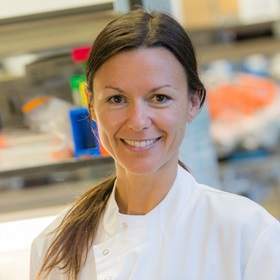Preclinical Modelling of Paediatric Cancer Evolution Group
Dr Alejandra Bruna's group is studying the phenotypic changes occurring through treatment to explore modulation of transcription dynamics as a therapeutic strategy in aggressive solid paediatric cancers.
Our group's goal is to improve our understanding of the biology of aggressive paediatric cancers. We use refined preclinical models that capture the features from which cancer originates.
Dr Alejandra Bruna
Group Leader:
Preclinical Modelling of Paediatric Cancer Evolution
Dr Alejandra Bruna leads the Preclinical Modelling of Paediatric Cancer Evolution Group. She has experience leading and contributing to preclinical programmes using improved patient-derived tumour models.
Researchers in this group
Dr Alejandra Bruna's group have written 44 publications
Most recent new publication 2/2025
See all their publicationsPaediatric cancer is rare, yet cancer remains the leading cause of disease-related death in children. Despite the encouraging high overall survival rates in paediatric oncology, children with progressive disease are typically difficult to treat.
Tumours are dynamic and adapt to environmental cues such as therapy. Yet, relatively few studies have comprehensively evaluated the phenotypic changes occurring in the caners of solid paediatric patient during and after treatment, and their impact on next line clinical intervention.
Significantly, because of small numbers and heterogeneity, even if new treatment developments came to light, it would be a real challenge to effectively test and gather valuable information from randomised clinical trials.
The goal of the Preclinical Modelling of Paediatric Cancer Evolution Group is to improve our understanding of the biology of aggressive paediatric cancers. We use refined preclinical models that capture the features from which cancer originates. This includes heterogeneity and functional genomics approaches within an evolutionary framework.
Currently, our work focuses on the following questions:
1) How do paediatric cancers evolve and adapt to the different complex environments they encounter to progress?
Our group aims to precisely model paediatric cancer's heterogeneity and its dynamics. We are leading the development and validation of preclinical models of rare and difficult-to-treat solid paediatric cancers that are predictive of a patient's drug responses.
Within the ICR's outstanding collaborative environment and its partnerships, the lab closely interacts with paediatric oncologists and mathematical modellers to simulate and study cancer's adaptability responses. We use bulk and single-cell DNA-, RNA- and chromatin immunoprecipitation (ChIP) -sequencing approaches in patient-derived tumour xenografts (pPDXs) and in ex vivo cultures of PDX cells (pPDTCs).
2) Which are the molecular determinants of solid paediatric cancer's adaptability processes and the biochemical signalling networks that determine fate decisions?
We use the power of various high-throughput functional screens, including CRISPR approaches against regulators of transcriptional plasticity, to identify the molecular determinants and regulators of paediatric cancer's evolutionary trajectories.
3) Which are the principles underlying solid paediatric cancer's adaptability responses?
Our group uses recent technological advances linking cellular barcoding with single-cell RNA-sequencing to monitor and quantify phenotypic events in single cells. They are then used to inform statistical and mathematical models to predict, given a set of starting conditions, how cancers evolve.
4) Which therapeutic strategies that target cancer's adaptability responses can be derived, and do they show improvement compared to standards-of-care in solid paediatric cancers?
We perform adaptations of Luria and Delbruck's (LD) fluctuation test in patient-derived cell cultures. Linked to single-cell RNA-sequencing, adaptations of LD's test will further our understanding of the heritability underlying drug-tolerant states.
By identifying the evolutionary laws, the molecular mechanisms and the cause, we can then intelligently design therapeutic strategies to prevent relapse. Our group's goal is to explore the potential of re-channelling paediatric tumour cells trajectories as a way to overcome resistance or relapse.
 .
.